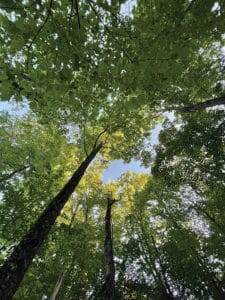By Emma Cotton/VTDigger
After more than an hour of discussion and questioning, the Vermont House preliminarily passed H.697, a bill that would allow some landowners to enroll passively managed land in the state’s Current Use program.
Lawmakers voted 83-43 on Friday morning, Feb. 25, with 22 members absent.

Before passing on the House floor, the bill cleared the House committees on Natural Resources, Fish and Wildlife and Ways and Means. The Committee on Agriculture and Forestry took additional testimony.
The use value appraisal program, also called Current Use, is widely credited with keeping Vermont heavily forested. It began in 1980 and allowed landowners to be taxed based on the value of their undeveloped land rather than on its value in the marketplace.
Right now, landowners are eligible for the program only if they farm or log their land, but H.697 proposes to change that. Property owners whose land has specific, environmentally valuable characteristics would be able to leave their land alone and still enter it in the program.
The 2 million acres currently enrolled in the program “have been well cared for, even as timber is harvested” with regard to water quality, flood resilience, scenery and so on, said Rep. Seth Bongartz, D-Manchester, who presented the bill to lawmakers.
“But, at the time the program was conceived more than 40 years ago, nobody was thinking about invasive species, climate change, increased flooding, carbon sequestration, carbon storage and the need for biodiversity,” Bongartz said. “The U.S. federal program was about retaining forest blocks with intelligent management of these forests for the production of forest products.”
The bill is based largely on a report with recommendations from Vermont’s Department of Forests, Parks and Recreation. Around 30% of land in the Current Use program could be managed under a new “Reserved Forestland” category, according to the bill.
Vermont Conservation Design, a plan created by the state’s Department of Fish & Wildlife and the Department of Forests, Parks and Recreation, recommends that 9% of the state’s forests return to old growth.
Recently, the “forever wild” movement has gained traction in Vermont. New organizations have actively preserved thousands of acres that won’t be logged again. Only around 3% of Vermont’s forests are managed passively, and less than 1% of Vermont’s forests have reached old-growth status, according to the state’s Department of Forests, Parks and Recreation.
Generally, opposition to the bill has fallen into two categories: Some think it does not go far enough, and others think the bill could adversely impact the timber and agriculture industries. Some lawmakers raised questions about the presiding committees’ process and said they should have invited more testimony from the silviculture industry.
Bongartz said the bill “is really about dipping our toe into the water and getting a feel for the program.”
“The committee has chosen a cautious approach that self-limits enrollment to parcels with a high degree of ecological sensitivity and which are already partially inoperable for traditional management because of that ecological significance,” Bongartz said.
The expansion to the program was also recommended in the state’s Climate Action Plan — one of the few recommendations Gov. Phil Scott directly opposed, fearing it would impact the state’s revenue.
A report showed this impact to the Education Fund would be relatively small — “approximately $100,000 and by less than $50,000 in General Fund revenues,” but that number could increase over time if the program underwent further expansion.




